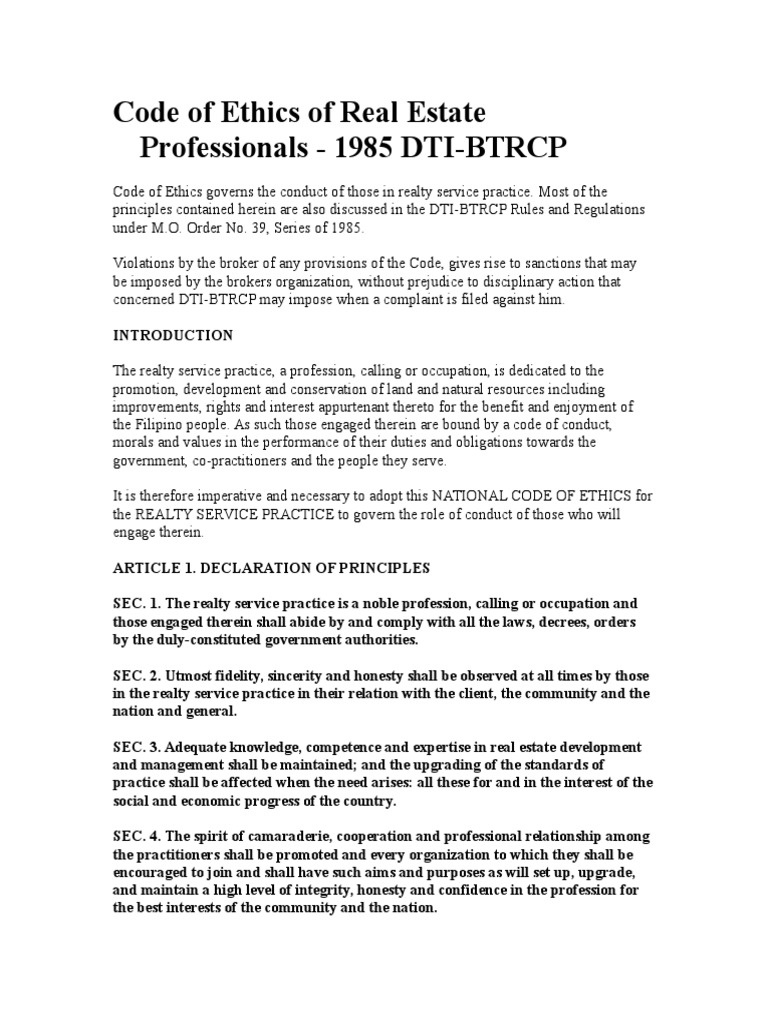In the world of real estate, navigating the complexities of ethical behavior is paramount for agents who wish to uphold their reputation and foster trust with clients. When we delve into the realm of real estate ethics, we encounter a treasure trove of principles designed to guide agents towards a more conscientious practice. Article 10 of the Code of Ethics, which prescribes standards around discrimination and professional conduct, stands as a catalyst for nurturing integrity within the industry. But let’s start with a thought-provoking question: What happens when the pursuit of profit clashes with ethical considerations? This dilemma looms large over many agents, inviting them to reflect on their responsibilities.
The cornerstone of real estate ethics lies in Article 10, which mandates that real estate professionals promote equal opportunity in housing. This article aims to eliminate bias based on race, color, religion, sex, handicap, familial status, or national origin. It compels agents to act not merely as businesspeople but as stewards of social responsibility. This is where the challenge arises: how can agents effectively promote inclusivity in an industry often influenced by the socioeconomic statuses of clients?
As the real estate landscape evolves, the influence of cultural dynamics and societal changes becomes ever more pronounced. Consequently, agents must first educate themselves on the historical context of housing inequalities. Understanding past injustices empowers agents to approach clients, regardless of their backgrounds, with empathy and authenticity. Recognizing that the ramifications of systemic discrimination are profound and longstanding allows agents to facilitate dialogues around inclusivity in the housing market.
Consider the agent who embraces diversity by tailoring their marketing strategies to reach underrepresented communities. For instance, employing multilingual advertising or collaborating with local nonprofits focused on housing advocacy can open doors to those who may feel excluded from traditional real estate avenues. These thoughtful approaches exemplify how Article 10 can translate into proactive measures that benefit both agents and their clients.
However, the arduous task of remaining ethically sound doesn’t end at simply advocating for equal housing opportunities. Agents are tasked with ensuring their conduct aligns with the ethical standards set forth in Article 10 at all times. This includes refraining from discriminatory practices in client interactions and adhering to a non-biased methodology in property transactions. Compliance with these standards demands an unwavering commitment to continuous ethical education and professional development.
Moreover, agents are encouraged to partake in ongoing training and workshops that delve into best practices for inclusivity and fair housing. Engaging in such learning experiences not only equips agents with invaluable knowledge but also demonstrates a genuine commitment to ethical practice to clients and colleagues alike. Are agents, however, truly making the most of these educational opportunities? Or is complacency creeping into their professional development? The latter can lead not only to ethical missteps but also to legal repercussions that jeopardize their careers.
Picture the scenario: an agent inadvertently neglects to acknowledge the diverse needs of a client due to a lack of awareness about cultural sensitivities. This oversight could result in misunderstandings, missed opportunities, and potential fallout from dissatisfaction. The reputational damage inflicted by such occurrences illustrates why remaining vigilant and informed is crucial for every real estate professional.
While navigating the principles outlined in Article 10 may seem daunting, it’s vital to remember that the effort to foster an ethical practice transcends mere compliance; it cultivates a richer, more prosperous environment for all stakeholders involved in real estate transactions. Ethical agents garner respect and loyalty through consistent adherence to their profession’s moral compass. Added to this is the possibility of enhanced referrals from satisfied clients who appreciate an agent’s commitment to fair and respectful treatment.
The question surfaces again: Can you envision a real estate landscape characterized by unwavering commitment to ethical standards? While the prospect may feel idealistic, it’s entirely attainable with persistent dedication and a community-focused mindset. Agents have the power to instigate profound change—not only through compliance with Article 10 but also by championing practices that promote dignity and respect across the board.
Moreover, the intersection of technology and ethics presents another fascinating challenge. As digital tools and platforms become integral to marketing and client engagement, agents must remain vigilant in upholding ethical standards online. The ease of disseminating information must also carry a sense of accountability; misinformation, selective representations, and stereotyping can proliferate in digital environments, thus compounding traditional biases. Therefore, it’s essential for agents to scrutinize their online presence—ensuring that all communications reflect not only accuracy but also respect for diversity.
In conclusion, embracing the ethical directives outlined in Article 10 is not a mere obligation for real estate agents – it is an empowering journey into cultivating an expansive landscape of opportunities. By championing inclusivity, undergoing continual education, and auditing their practices within the evolving digital realm, agents can simultaneously elevate their careers and contribute to a more ethically sound industry. Let it not be said that agents were merely spectators in the evolution of real estate ethics; rather, let history reflect their role as trailblazers in the quest for a just and equitable market for all.
